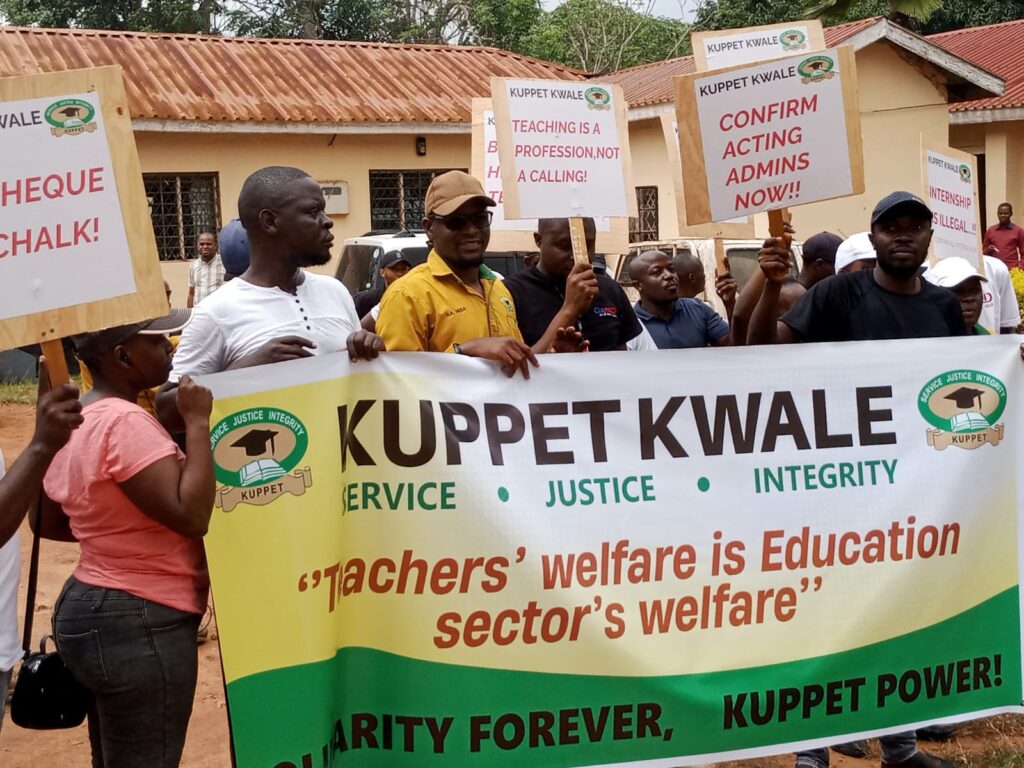By Mwanaharusi Rashid.
Stakeholders of the Kenya Union of Post Primary Education Teachers (KUPPET) in Kwale County have joined secondary school teachers in nationwide protests, expressing their growing frustration with the government and the Teachers Service Commission (TSC).
The teachers, led by the KUPPET Kwale branch, have been demanding that their fundamental grievances be addressed, accusing the TSC of oppressing them with unfulfilled promises that have severely impacted their professional duties and well-being.
The teachers in Kwale County yesterday united in peaceful demonstrations, echoing the sentiments of their colleagues across the country. These protests are part of an ongoing strike that has seen educators take to the streets to voice their discontent with the TSC and the government’s handling of their concerns.
The core of their grievances lies in what they describe as the TSC’s continuous pattern of making false promises, which they argue has left them feeling neglected and disillusioned.
Leonard Oronje, the Secretary of KUPPET’s Kwale branch, who was at the forefront of these demonstrations. Speaking to reporters in Kwale town, Oronje did not mince words in expressing his disappointment with the current state of affairs.
He emphasized the gravity of the situation, noting that teachers, who are essential to the country’s education system, are losing their lives due to inadequate medical care. This, he pointed out, is particularly disheartening given that teachers are among the major taxpayers in the country.
“It is extremely disheartening to witness our colleagues losing their lives because of poor medical care. We are the backbone of this nation’s education system, yet we are being neglected and subjected to false promises,” Oronje stated.
He added that the failure of the TSC to address these critical issues is not only affecting the teachers but also the quality of education in the country.
Oronje’s remarks were echoed by several teachers who participated in the protests. They shared their personal experiences, painting a grim picture of the challenges they face in their profession. Many teachers described how their job has become increasingly difficult, with mounting frustrations over the lack of progress in addressing their grievances.
They pointed to the TSC’s failure to deliver on promises regarding salary increments, promotions, and improved working conditions as some of the key issues that have pushed them to take to the streets.
“The teaching profession is becoming unbearable. We are overworked, underpaid, and constantly misled by promises that never materialize. How can we be expected to perform our duties effectively under such conditions?” questioned one teacher who chose to remain anonymous.
The protests in Kwale reached a crescendo at the TSC director’s office in the county, where a large group of teachers gathered to demand immediate action. The atmosphere was charged with determination, as the educators vowed not to return to their classrooms until their demands were heard and addressed.
Peter Muasya, the TSC Director in Kwale County, was on hand to receive the teachers’ petition. In his address to the protesting educators, Muasya acknowledged their grievances and assured them that the concerns raised would be forwarded to the relevant offices for further consideration.
He urged the teachers to remain patient and trust that their issues would be addressed in due course.
“I understand your frustrations, and I want to assure you that your grievances will be taken seriously. The TSC is committed to resolving these issues, and I will personally ensure that your concerns are communicated to the appropriate channels,” Muasya told the crowd.
Despite Muasya’s assurances, the teachers remained resolute in their stance. They expressed skepticism about the TSC’s willingness to address their concerns, given the history of unfulfilled promises. Many of the teachers who spoke during the protest indicated that they would not return to work until they see concrete actions being taken to address their grievances.
“We have heard these promises before, but nothing has changed. We are tired of waiting, and this time, we will not back down until we see real results,” one teacher declared.
The protests in Kwale are part of a broader wave of demonstrations sweeping across the country as teachers continue to push for better working conditions, fair pay, and improved benefits. The outcome of these protests remains uncertain, but one thing is clear: the teachers in Kwale, like their counterparts nationwide, are determined to fight for their rights and will not rest until their voices are heard.


